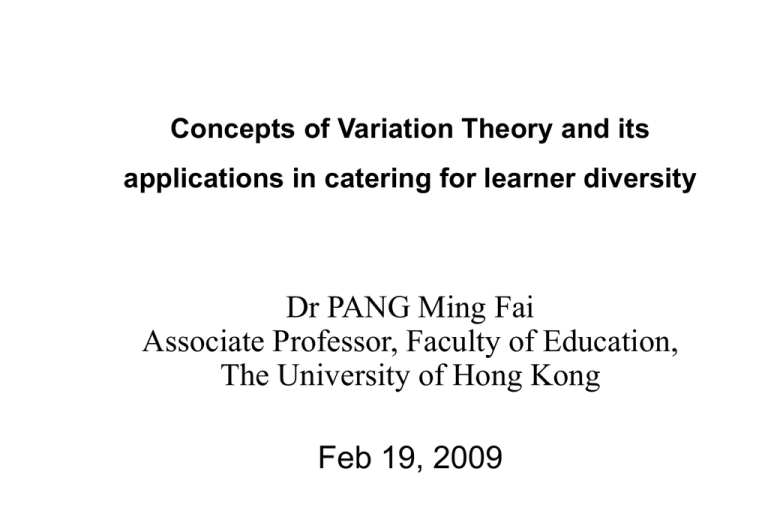ld drpang feb09
advertisement

Concepts of Variation Theory and its applications in catering for learner diversity Dr PANG Ming Fai Associate Professor, Faculty of Education, The University of Hong Kong Feb 19, 2009 Phenomenography Ference Marton The Art of Teaching All things to All Men ‘People always assume others see the world in exactly the same way as they do, whilst they typically see the same thing in qualitatively different ways.’ Whatever phenomenon people experience, we can identify a limited number of qualitatively different ways in which the phenomenon or the situation is experienced. Detailed knowledge of the qualitatively different ways in which learners understand the central phenomena, concepts and principles within a domain prior to study is deemed critical for developing their understanding of the central phenomena, concepts and principles, and hence for their mastery of the domain (Bowden et al, 1992). In parallel, it is important to develop a good understanding of teachers’ qualitatively different ways of understanding of the phenomenon in question, which will influence their practice. It is useful to pool teachers’ expertise in dealing with the phenomenon in question, as teachers might have developed different ways of handling it in the past. All these points to the variation in the learners’ ways of understanding or seeing the phenomenon in question as well as the variation in the teachers’ ways of understanding and handling the phenomenon. On top of these, variation can be used as a pedagogical tool for helping teachers design their instructions and support student learning. Variation Theory Learning is associated with a change in discernment, which entails a change in the aspect(s) of the phenomenon in the focal awareness of the learner. Variation is deemed to be the key for effective discernment, and the chief mechanism of learning. The discernment of a certain aspect of the phenomenon presupposes experienced variations in that aspect. There is no discernment when there is no variation. According to Marton (1999), variation is the sine qua non of learning. For instance, one would not be able to discern the aspect of gender should there be only one gender in the world; or the aspect of happiness should the Earth be filled with invariable happiness; or the aspect of colour should there be only one colour, say blue, in the world. According to the variation theory, “a way of seeing” can be defined in terms of critical features that must be discerned and focused on simultaneously. In order to discern a particular feature, the individual must experience variation in the dimension corresponding to the feature in question. E.g. in a Visual Art lesson, if the teacher wants to help the students to discern the critical aspect of colour in their design work, they need to make available to students different colours, such as yellow, blue, green, etc which are to be applied on the same design. This allows students to experience how the critical aspect of colour impacts the quality of design. E.g. in a Mathematics lesson, if the teacher wants to help the students to discern the critical aspect of vertical distance in determining the value of slope, they need to vary the vertical distance and keep the horizontal distance invariant. This would allow the students to discern the critical aspect of vertical distance and experience how it impacts the value of slope. The variation theory highlights the importance of the patterns of variation and invariance which are made available to the students what is varied simultaneously and what is kept invariant - in attempts to attain the objects of learning. To make it possible for the learners to develop a certain way of seeing something, the pattern of variation and invariance they must necessarily experience has to be constituted. Patterns of Variation and Invariance Types: 1. Contrast: In order to experience something, one must experience something else to compare it with. For example, in order to understand what “three” is, one must experience other numbers. 2. Generalization: In order to fully understand what “three” is, we must also experience varying appearances of “three” so that one can generalize the meaning of “three” from these cases. 3. Separation: In order to experience a certain aspect of something, and in order to separate this aspect from other aspects, it must vary while other aspects remain invariant. For example, in order to experience the variation of demand and put students’ focal awareness on it, we should vary the dimension of demand only whilst keeping the supply invariant. 4. Fusion: If there are several critical aspects that the learner has to take into account at the same time, the teacher needs to vary the variations of different critical aspects simultaneously (i.e. fusion) so that these aspects will all be experienced simultaneously. Say, we need to vary both numerator and denominator at the same time so that students could focus on the simultaneous variation of these two critical aspects to the value of a fraction. Group Task 1 Study the patterns of variation and invariance in the next slide and discuss the following questions. 1. Which pattern(s) of variation and invariance do you think teachers often use when teaching punctuation to students in primary school? 2. Which pattern(s) of variation and invariance or which sequence do you think would help students learn the use of punctuation most? Why? STUDY OF PUNCTUATION Pattern 1 • You love her. • The table is green. • Mr Putman stays put. content v form i Pattern 2 • You love her. • Why do you love her? • Love her! content i form v Pattern 3 • You love her. • Is the car there? • Don’t move ! content v form v Gustavsson, L (2008) Att bli bättre lärare. (Becoming a better teacher). Kristianstad: Högskolan i Kristianstad, p 109. Variation Theory • Variation is a powerful pedagogical tool for developing a certain way of experiencing the object of learning, by focusing students’ awareness on the critical aspects of the phenomenon in a simultaneous manner. The Learning Study The notion of “learning study” was inspired by the idea of “design experiments” (Brown, 1992; Collins, 1992) and by the systematic efforts of Japanese and Chinese teachers to conduct indepth studies of particular lessons, that is, “lesson study” (e.g. Stigler & Hiebert, 1999) and “teaching research groups” (Ma, 1999) • It aims to build innovative learning environments and to conduct in-depth studies of the theoretically grounded innovations. • It aims to pool teachers’ valuable experiences in one or a series of research lessons to improve teaching and learning. • The primary focus is on an object of learning, not teaching methods. An object of learning is a specific insight, skill, or capability that the students are expected to develop during a lesson, or during a limited sequence of lessons. There are two aspects: the direct and the indirect objects of learning. The former is defined in terms of content, such as demand and supply, fraction, photosynthesis, etc. The latter refers to the kind of capability that the students are supposed to develop, such as being able to define, being able to give examples, or being able to discern the critical aspects of novel situations (see Marton et al., 2004, p. 4). • The teachers, who work together with a researcher or on their own, choose a particular object of learning that is central to the curriculum that they all teach and that is known to cause difficulties for the students. • Once the object of learning is chosen, the group starts to plan the lesson(s) with a special focus on making it possible for the students to appropriate the object of learning. The main resources that can be drawn upon: - the teachers’ own experiences in dealing with this particular object of learning; - previous research and other available resources, - the particular theoretical framework (the variation theory of learning) that they use to identify the necessary conditions for their specific learning target, - the exploration of the prior understanding of their students, or the exploration of the extent to which the object of learning and/or its prerequisites have been appropriated by the students before teaching starts – the initial point of departure. The focus of the teachers is on the way in which the specific object of learning will be handled in terms of the critical aspects of the direct object of learning that will vary and those that will remain invariant during the sequence of events in the lesson(s). The focus on what varies and what is invariant derives from the specific framework grounded on the variation theory the teachers are making use of. The choice of other factors such as whole class teaching, group work, and form of representation, and the use of textual or electronic resources is subordinate to the teachers’ design of the pattern of variation and invariance. One of the teachers is chosen by the group to carry out the lesson while the other members of the group observe. What the students have learned is probed by written questions through class work, homework or test/exam and/or interviews. From the answers of the students to the written and oral questions given after the lesson, we can characterize the learners’ subsequent point of departure. The lesson is analyzed in terms of whether it was possible to appropriate the object of learning through the pattern of variation and invariance that was constituted by the teacher and the students jointly. This is the basic idea of the variation framework that underlies a learning study. The group may then come up with some suggestions about what can be improved in the lesson(s) and methods for the implementation of improvements. Another teacher is nominated and carries through the new version of the lesson according to the same procedure. The cycle is repeated up to four times, and the study is always concluded by documentation. Experience Sharing English: Mr. To Kwok Kuen (Pat Heung Central Primary School) Group Task 2 1. Think of a concept or an object of learning in your subject area. 2. List the critical aspects of the concept or object of learning so that students will have the appropriate understanding of it. 3. Consider how you may introduce variation in those aspects so that students can discern them. You may consider the following objects of learning: 1. ‘Setting an enquiry topic or question for project work’ 2. ‘Using the skill of flashbacks in writing narrative essay’, 3. ‘Understanding the concept of slope in Mathematics’, 4. Any other topics or objects of learning that you see fit. Catering for learner diversity Learner diversity is inevitable, as each learner is unique and different. Different learners have different points of departure which are influenced by a number of factors such as their family background, experience, character, learning attitude, etc. Learners see things differently and they learn differently. Instead of trying to get rid of learner diversity, we attempt to make good use of it and utilize it as a kind of learning or teaching resources. Instead of requiring every learner to come up with identical learning outcomes, we attempt to help all learners excel and actualize their potential. Instead of handling learner diversity by some one-off measures, we evaluate the progress of the learners constantly, see what and how they have achieved, and revise the current measures or introduce new measures. Instead of simply judging success by means of the learning outcomes, we compare their initial and subsequent points of departure and make continuous attempts to support the learners. Conclusion To start with, it is of utmost importance to develop a good understanding of the learners’ experiences, the ever-changing learner diversity, and their different ways of understanding of the world they live in throughout the process of education. By pooling teachers’ expertise and experience of handling the object of learning and making systematic use of variation as a pedagogical tool, it is hoped that learning of ALL students can be enhanced and their points of departure will progress. We re-examine their new positions and devise measures to cater for learner diversity in an iterative way. Thank You Email: pangmf@hkucc.hku.hk



